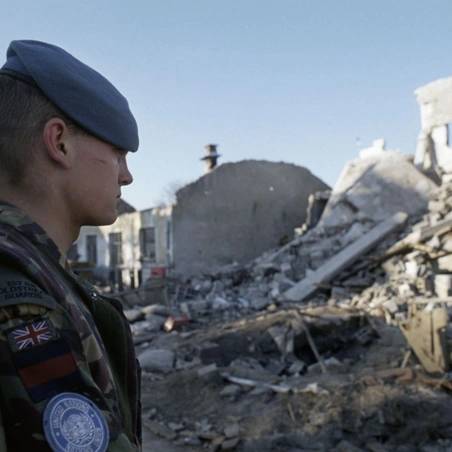In 1996 Trooper Lee Buss-Blair was in Bosnia, driving an armoured ambulance. He had been on the Reserve List and when called to serve, “I volunteered like, in a heartbeat. Didn't even have to think twice about it.”
It had been five years since he left the Army, a profession that had been his goal since childhood. He was 14 when he had started the application process; ultimately becoming a tank driver. Lee was deployed to the Gulf War in 1990, where he served in the reconnaissance troop. Close to Iraqi front lines in a lightly armoured Scorpion vehicle, Lee reflects “you're in an exposed area without a huge amount of, like, protection. I can't remember the life expectancy they'd given us, but it wasn't long.”

Lee at the Crossroads
While facing the reality of the battlefield, Lee was fighting a personal battle. When he joined the Army, being gay was considered ‘incompatible’ with service and was a chargeable offence. Lee had no choice but to keep a huge part of himself hidden.
On post-operational leave after Iraq, Lee faced a crossroads. “Meeting someone whom I thought I loved made me think: ‘I have to make a choice about who I am.’ Being a gay man and being a soldier just weren't compatible at the time.”
Lee made the heart-rending decision to leave the Army, and he became a Healthcare Assistant on the HIV ward at St Bartholomew’s Hospital at the height of the AIDS epidemic. Aged just 23, he was seeing more death than he had in Iraq. “That was a really, really hard time,” he recalls, “but it gave you that sense of purpose and mission and working in a team – a lot of the things you got from military service.”
Then in 1996, the UK was sending thousands of personnel to be part of NATO’s Implementation Force in Bosnia to ensure the peace would hold. “They were short of Control Signallers so that's why they wrote to me seeking volunteers.”
Lee had been living as an openly gay man for five years, but the ban was still in place in the Armed Forces. “I promised myself that I would not deny my sexuality, but at the same time, I wouldn’t necessarily discuss it,” he recalls.

Bosnia service
In Bosnia, Lee was stationed in Mrkonjic Grad in a medical centre, and as well as driving the armoured ambulance he was a duty medic, treating service personnel. Based in a valley, he recalls that snipers would take pot shots at them and remembers a difficult time when the civilian authorities were resuming responsibilities and he had no choice but to turn away a young mother and her baby and direct them to the local hospital, which he doubted could treat the child adequately.
Lee was also re-adjusting to military life. He removed all the piercings on his face, leaving just the ones on his tongue, “and that’s where things started to go a bit wrong,” he recalls.
Lee’s Commanding Officer objected to the tongue piercings and told him to take them out. This was a red line for Lee; he felt he’d given up enough of his identity to serve and he refused. “Eventually, we got to the point where my Commanding Officer said: ‘If you don't take it out, I’m going to charge you.’ In a pique of fury, I replied: ‘Well, if you’re going to charge me, let’s make it worthwhile’, and I came out.”
However, there was no-one available to take on Lee’s role as ambulance driver and duty medic, so his exit was not as swift as it could have been. “Things just went very quiet. And I continued to do my job. I continued to, you know, serve with all of the other kind of like guys and gals. People started to find out about it, which wasn't an issue at all. No one cared.”
Eventually he was told that he would be sent home on a flight to Brize Norton. A couple of days later he was discharged. Like many others who suffered under the ban, Lee’s record stated ‘Services No Longer Required’ (SNLR). This non-specific wording came with an associated stigma.

“My opportunity to serve was taken from me”
His SNLR discharge meant he was struck off the Reserve List, preventing him from being deployed to Iraq in 2002 (despite the ban on gay men and women serving being lifted in 2000). Lee was plagued by guilt. Every time a British serviceperson died in Iraq or Afghanistan, he felt it should have been him. “I think that had more of a psychological impact on me than my experiences in the Gulf and my experiences in Bosnia and being discharged.”
“The injustice continued because my opportunity to serve was taken from me.”
Lee’s involvement with the Etherton Report made him realise he wasn’t alone. This review was commissioned to consider the impact on LGBT personnel in the armed forces up to 2000, and was published in 2023.
Lee was finally able to get his military records updated to show the reason for his discharge. This meant he could go back on the Reserve List and, despite being 54, with only a few months until he would reach the upper age limit, he did.
Back in his hometown of Brighton, Lee joined the RBL and the Royal Navy LGBTQ+ network to march at the city’s Pride. This was hugely important to him – he was finally able to be himself. “The two parts of me aren't contradictory or in conflict: they are one,” he says. “I’m not a gay man and a veteran. I’m a gay veteran.”





